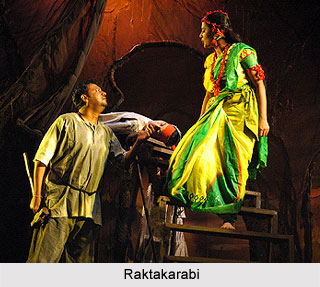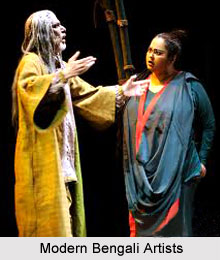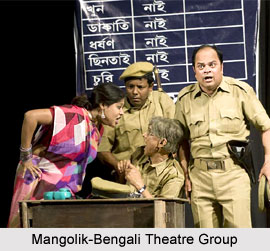 Modern Bengali theatre goes back a long way to the time when the Kolkata Theatres were being built in the year 1779. It was during this time that, Horasim Lebedev, a Russian Dramatist, along with, Goloknath Das, enthusiastic Bengali theatre lover, staged the Bangla translations of two English comedies, `Disguise` and `Love is the best doctor` in Kolkata.
Modern Bengali theatre goes back a long way to the time when the Kolkata Theatres were being built in the year 1779. It was during this time that, Horasim Lebedev, a Russian Dramatist, along with, Goloknath Das, enthusiastic Bengali theatre lover, staged the Bangla translations of two English comedies, `Disguise` and `Love is the best doctor` in Kolkata.
Some decades later, Prasanna Kumar Thakur, in 1831, set up `Hindu Rangamanch` at Kolkata and staged Wilson`s English translation of Bhavabhuti`s Sanskrit drama `Uttar Ramacharitam` laying the base for modern theatre in India. Some of the other essential efforts on the Bengal theatre circuit include Nabin Basu`s Jorasanko Natyashala (1854), the private stages of Ashutosh Deb and Ramjay Basak (1857), Vidyotsahini Mancha (1857), Belgachia Natyashala (1858), Metropolitan Theatre (1859), Shobhabazar Private Theatrical Society (1865), Bahubazar Natyashala (1866) and Bagbazar Amateur Theatre (1868).
The Indian city of Kolkata, being the capital of country till 1911, came under the influence of British. By the end of middle part of 19th century, rich and young Bengalis of Kolkata began to write plays on social issues like British naturalistic models, interweaving them with Indian songs and music. Two plays of Rabindranath Tagore- Raja (The King of the Dark Chamber) and Raktakarabi (Red Oleanders) were an effective part of this initial effort. Rabindranath as a Dramatist contributed immensely to the history of Bengali theatre. The great works of William Shakespeare were also translated widely and adapted in plays for Bengali theatre. By the last part of 19th century, public theatres, managed and supported by Indian artists and deliberate to cater to tastes of Indian urban people, were set up.
 Grandfather of Jyotirindranath Tagore and Rabindranath Tagore- Dwarkanath Tagore, were mainly responsible for running and building a private theatre known as Jorasanko Theatre. During this period, Bengali theatre assimilated western ideas immensely from playwrights like Jyotirindranath Tagore and Madhusudan Dutt who freely adapted from English, Greek and French sources. In the year 1858, Belgachia Natyashala, was established which became the centre for theatre activities in Kolkata during that period. It produced great plays like Ram Narayan Tarkaratna`s Ratnabali and Madhusudhan Dutt`s Sarmistha. Girish Ghosh, in 1872, organised a National Theatre which, along with other related societies, staged adaptations from English and Indian classic literary sources as well as social and historical plays. The time between 1830 and 1872 was rightly termed as age of amateur theatre of Bengal.
Grandfather of Jyotirindranath Tagore and Rabindranath Tagore- Dwarkanath Tagore, were mainly responsible for running and building a private theatre known as Jorasanko Theatre. During this period, Bengali theatre assimilated western ideas immensely from playwrights like Jyotirindranath Tagore and Madhusudan Dutt who freely adapted from English, Greek and French sources. In the year 1858, Belgachia Natyashala, was established which became the centre for theatre activities in Kolkata during that period. It produced great plays like Ram Narayan Tarkaratna`s Ratnabali and Madhusudhan Dutt`s Sarmistha. Girish Ghosh, in 1872, organised a National Theatre which, along with other related societies, staged adaptations from English and Indian classic literary sources as well as social and historical plays. The time between 1830 and 1872 was rightly termed as age of amateur theatre of Bengal.
Madhusudan Dutt`s emergence as a dramatist brought to the infant Bengali theatre much needed sustenance in the decade before the opening of the public theatre in 1872. During the greater part of their existence, the `private` theatres did a great deal to familiarise the new theatrical form. But they had a rather awkward handicap. The plays themselves were Sanskrit originals translated into Bengali but theatrically they had to be clothed in robes borrowed second hand from the English theatre. This was unavoidable because original Bengali plays that were not also the despised jatra plays were simply not there. In the beginning the theatre enthusiasts among the first generation of English-educated Bengalis staged English plays imitating in this as in other respects the English residents of the city. But with the dawning sense that plays had to be in the language the people in general spoke, the promoters fell back upon translation of Sanskrit plays, partly from reasons of national pride. But such plays were not many. Soon original plays were written, and Madhusudan Dutt played a main part along with Dinabandhu Mitra. Bengali dramatic literature got off with the start it did.
However, the person who is generally regarded as the first Bengali dramatist is Ramnarain Tarkaratna -he wrote a play- Kulinkul-asarbasva, in 1854. lt was written for the theatre and was the first ever Bengali play of any merit with a sense, however embryonic, of dramatic composition. The characters are conceived as individuals, and their fates revealed through various actions compartmentalised into acts and scenes. The play was first performed in March, 1857 in the house of Ramjay Basak and repeated several times there and elsewhere. Ramnarain wrote a number of other plays many of which dealt, like Kulinkulasarbasva, with the evils of the caste system.
 Bengali theatre soon became a major medium of expressing political, social and contemporary issues of relevance to common man. Many plays were staged that openly criticized the current situation in society. Some of the major works included Naba Natak and Kulinakulasarbasa that spoke against polygamy and Nildarpan (1875) criticised British for their exploiting local farmers. Dinabandhu Mitra`s Nildarpan attained such height that it made British realize the strength of political theatre, and literally forced them to spread the Dramatic Performances Control Act of 1876, which promoted censorship of the arts. Sisir Kumar Bhaduri, Ahindra Chowdhury, Naresh Mitra, Durgadas Banerjee and Sushila Sundari are some of the respected names of Bengal Theatre during those days.
Bengali theatre soon became a major medium of expressing political, social and contemporary issues of relevance to common man. Many plays were staged that openly criticized the current situation in society. Some of the major works included Naba Natak and Kulinakulasarbasa that spoke against polygamy and Nildarpan (1875) criticised British for their exploiting local farmers. Dinabandhu Mitra`s Nildarpan attained such height that it made British realize the strength of political theatre, and literally forced them to spread the Dramatic Performances Control Act of 1876, which promoted censorship of the arts. Sisir Kumar Bhaduri, Ahindra Chowdhury, Naresh Mitra, Durgadas Banerjee and Sushila Sundari are some of the respected names of Bengal Theatre during those days.
With the setting up of Indian People`s Theatre Association (IPTA), theatre came very close to people. Theatres, through its creative pursuits, started to address critical social and political issues. With passionate and dedicated efforts from Girish Ghosh, D.L.Roy, Rabindranath Tagore, Bijon Bhattacharya, Utpal Dutt, Shambhu Mitra, Balraj Sahani, Habib Tanvir and several others Bengali theatre continued to flourish. Utpal Dutt did set up the `Little Theatre Group`, which helped him to convey his social thoughts to the audience. Plays like Bahuroopi also added value to this art form, and helped to add quality and depth.
In the phase of contemporary Bengali theatre there are many talented dramatists that came through like- Badal Sarkar, Mohit Chattopadhyaya, Arun Mukherjee and others which led to a strake improvement in style. Badal Sarkar made many different types of dramas like Pagla Ghoda, Spartacus, Evam Indrajit, Baki Itihas, Baasi Khabar, Prastava and Juloos, which became trend-setters in the contemporary Bengali Theatre.




















